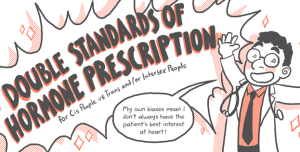
A person comforts their crying friend.
Starting to heal after pregnancy loss is far from easy.
As someone who’s miscarried before, I know that having support can be indescribably helpful.
After losing my pregnancy a few months ago, I was heartbroken. My friends carried me through it, held me, and reminded me that it wasn’t my fault. They showed me how to practice self-care and how to let myself mourn a person that never was.
I’ve been on the other side, too – I’ve supported people who have had miscarriages. Some of them wanted their pregnancies and some did not. Some were heartbroken by their miscarriage; some were relieved. Many had a number of complex feelings about their pregnancy loss.
I know it’s difficult to support someone after a miscarriage. You probably didn’t expect it to happen, so it’s not like you’ve been preparing for this moment and reading up on how to support a friend or family member through it.
But I also know that support is essential – it’ll be even harder for your loved one to sort out their complex feelings if they don’t have effective support.
So, I want to talk about a few ways we can be supportive to those who’ve miscarried.
1. Communicate, Communicate, Communicate
Communication is always the first step, so I want to reiterate its importance.
I maintain that the best way to support someone – no matter what they’re going through – is to ask them how they want you to support them.
No article (including this one) can describe the support that everyone needs, because everybody has different experiences and everybody heals differently.
If someone tells you they’ve had a miscarriage, and you want to be supportive towards them, tell them that. Gently approach them and let them know you’re there for them.
Even if they can’t articulate their needs properly, merely asking them how they want to be supported can be comforting.
2. Use The Language They’re Comfortable Using
Some of your loved ones might want to discuss their miscarriage(s) with you.
When you’re communicating with someone about their pregnancy loss, it’s important to be mindful of the language you use.
For example, some might refer to their miscarriage as a loss of an embryo or fetus; others might feel that they have lost a baby.
In a brilliant essay for The Establishment, Anne Theriault explains why pro-choice rhetoric can be upsetting and triggering for those who’ve had miscarriages. She explains it as follows:
I’ve been pro-choice for as long as I can remember. […] When challenged on my beliefs, I’d throw out the same pro-choice arguments I’d heard other people make: that it wasn’t a baby, it was just a clump of cells. It was a zygote, a blastocyst, an embryo, but not a person. It was a ball of tissue. That abortion wasn’t murder because a fetus wasn’t really alive. And so on, and so forth.
Except that here I was pregnant with what was, to me, something that was very much a person. I knew that if I miscarried, it would feel like a death. And how could I reconcile that personal truth with the pro-choice arguments that I also knew to be true?
Theriault’s words resonated with me so much.
I do believe that a fetus is, scientifically, not a baby, and I’m obviously pro-choice.
But at the same time, the hurt I felt when I had a miscarriage was not as if I had lost a “clump of cells” – it was as if I’d lost someone dear to me.
It was not inaccurate for me to feel that I lost a baby: I had a vision of a small, sweet human that I would care for. I’d hold their feet and sing them to sleep. I would feed them and watch them grow and become their own person. That’s what I had imagined, and I loved my baby before they came into the world.
When I lost my pregnancy, I didn’t simply lose a clump of cells. I lost my chance at being a mother to a brand new, fresh human. I lost my chance at meeting someone I knew I would love.
That’s why I was in mourning.
I think many feminists and pro-choicers might unintentionally slip up here and force someone to use language they’re not comfortable using.
It’s valid for us to mourn our pregnancies as if our children had been born. For many of us, our pregnancy is not just a clump of cells, but a signal of an imminent person – a person we imagine spending time with, a person we plan for, a person we love.
It might seem like a contradiction, but ultimately it’s not. Grieving after a miscarriage certainly doesn’t mean you believe abortion is inherently wrong.
The bottom line is that, when we endure trauma, talking about it can be healing – but it’s hard to talk about it unless it’s on our own terms and using our own language.
3. Respect Their Privacy, Respect Their Publicity
It should go without saying that everyone deserves a level of privacy when it comes to their bodies and medical histories.
This respect for privacy is often not extended to marginalized groups. Pregnant people, too, may have people violate their personal space.
As Birdie McNeill wrote, “Even for gender-conforming cis women, being pregnant is viewed as an invitation for advice, open criticism, and, in some cases, blatant disregard for personal rights, as the health of the fetus is regarded as a higher priority than the well-being of the parent.”
I’d argue that, to a certain extent, the same mindset is applied to miscarriage.
Miscarriage is seen as something shameful that we shouldn’t talk about – which is part of the reason why people are told not to announce their pregnancy until the second trimester.
At the same time, personal experience indicates that people feel entitled to know the details of someone’s miscarriage once it’s made public. When I spoke out about my miscarriage, many people – including people I didn’t know very well – asked very personal questions.
Since there are many myths relating to miscarriage, many people are confused by our experience. They might ask probing questions out of curiosity, but those questions might be triggering, upsetting, and rude.
It’s a good idea to ask someone how they’re feeling, if they want to talk, and how they’d like to be supported. It’s a good idea to listen to the information they choose to give.
It’s not a good idea to ask probing questions about the reason for the miscarriage (hint: many of us don’t know), the length of the pregnancy, and the person who impregnated them.
On the flip side, remember that some people might want to be purposefully transparent about their miscarriage. In a world where miscarriage is stigmatized, there’s something radical about reclaiming our stories of pregnancy loss.
Some of us don’t want our miscarriages to stay secret. Support us in speaking out if that’s what we want to do. Don’t discourage us.
Respecting privacy is important, but it goes along with respecting someone’s right to decide what’s private and what’s not.
Whatever we decide to do with our experience is up to us.
4. Do Helpful, Practical Things
While miscarriage affects everyone differently, many people feel traumatized.
I know that when I’m traumatized, I have very little physical energy. That means that I struggle to carry out my physical responsibilities like cleaning, cooking and other errands.
And when these errands pile up, it feels even more overwhelming.
If you have some time and energy to spare, ask if there are any practical ways you can help.
Maybe they can’t summon up the energy to clean their home, and you can do a few dishes for them or run a load of laundry. Perhaps they’ll benefit from a hearty home-cooked meal, or maybe they need company while they do some shopping.
If the miscarriage was recent, they might need a lift to medical appointments. If you have a car, this is one way you could help out. They might want someone to be with them as they speak to doctors or nurses about what they experienced.
If you live far away from your friend, you might struggle to find practical ways to help them out. If you have the budget to, consider sending them a small care package of useful things, or ordering them food online.
When we give people space to stop worrying about certain practical things – like their laundry or transportation or feeding themselves – we give them space to mourn and to heal.
We also make living feel slightly more worthwhile and manageable.
***
I’m not sure where I’d be without the support I was given after I miscarried.
Healing hasn’t been a linear journey. I still choke up if I see tiny socks in a clothing store, or when I hold my baby nephew. My period is triggering because the menstrual blood reminds me of losing my pregnancy. I still constantly blame myself for the loss of a baby – a baby who would have been born this very month.
But at the same time, I know that the support I’ve been given has helped me immensely. My supporters weren’t simply there for a few weeks: They’ve been there this entire time, always willing to listen to me, always willing to help me when I needed them.
Everyone who has ever miscarried deserves the love and nurturing I received.
[do_widget id=’text-101′]
Sian Ferguson is a Contributing Writer for Everyday Feminism and full-time freelance writer based in South Africa. Her work has been featured on various sites, including Ravishly, MassRoots, Matador Network, and more. She’s particularly interested in writing about queer issues, misogyny, healing after sexual trauma and rape culture. You can follow her on Twitter and Instagram. Read her articles here.
Search our 3000+ articles!
Read our articles about:
Our online racial justice training
Used by hundreds of universities, non-profits, and businesses.
Click to learn more
Most Read Articles
- « Previous
- 1
- …
- 30
- 31
- 32



















